Cells that begin in the lungs and develop out of control are known as lung cancer. Lung cancer typically begins in the cells lining the airways. The cells divide quickly and create tumors rather than grow into healthy lung tissue.
Through metastasis, lung cancer can grow and move beyond the lung to other regions of the body. Though they can start in any section of the lung, epithelial cells—the cells lining the bigger and smaller airways known as bronchi and bronchioles—are the site of 90% of lung malignancies.
| Country | Cost | Local_currency |
|---|---|---|
| United Kingdom | USD 11392 - 22000 | 9000 - 17380 |
| Turkey | USD 2849 - 18113 | 85869 - 545926 |
| Spain | USD 62609 - 89731 | 57600 - 82553 |
| United States | USD 12000 - 25000 | 12000 - 25000 |
| Singapore | USD 25000 | 33500 |
Treatment cost

Types of Lung Cancer Treatment in Sarvodaya Hospital and Research Centre and its associated cost
| Treatment Option | Approximate Cost Range (USD) | Approximate Cost Range (INR) |
|---|---|---|
| Lung Cancer Treatment (Overall) | 6094 - 8106 | 501189 - 667725 |
| Surgery | 4066 - 7104 | 332184 - 581279 |
| Lobectomy | 1526 - 6065 | 124391 - 500031 |
| Pneumonectomy | 2023 - 8124 | 165903 - 668777 |
| Segmentectomy | 1515 - 5083 | 125021 - 418010 |
| Chemotherapy | 815 - 2036 | 66688 - 166423 |
| Targeted Therapy | 1013 - 3043 | 83570 - 250767 |
| Immunotherapy | 1518 - 3567 | 124461 - 292533 |
| Radiation Therapy | 2028 - 4587 | 165933 - 373096 |
| Palliative Care | 505 - 1529 | 41506 - 124884 |
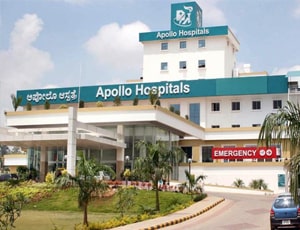
Types of Lung Cancer Treatment in Apollo Hospitals Bannerghatta and its associated cost
| Treatment Option | Approximate Cost Range (USD) | Approximate Cost Range (INR) |
|---|---|---|
| Lung Cancer Treatment (Overall) | 6707 - 8964 | 557863 - 727658 |
| Surgery | 4497 - 7753 | 366249 - 636940 |
| Lobectomy | 1696 - 6660 | 135406 - 554600 |
| Pneumonectomy | 2283 - 9097 | 186044 - 736683 |
| Segmentectomy | 1700 - 5739 | 137987 - 456963 |
| Chemotherapy | 911 - 2220 | 74447 - 184294 |
| Targeted Therapy | 1146 - 3408 | 93264 - 274316 |
| Immunotherapy | 1678 - 3926 | 138390 - 327400 |
| Radiation Therapy | 2261 - 5117 | 183945 - 424093 |
| Palliative Care | 568 - 1663 | 45246 - 139341 |
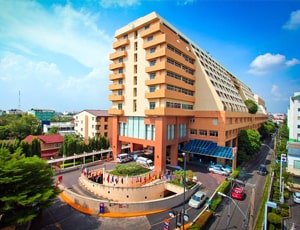
Types of Lung Cancer Treatment in Vejthani Hospital and its associated cost
| Treatment Option | Approximate Cost Range (USD) | Approximate Cost Range (THB) |
|---|---|---|
| Lung Cancer Treatment (Overall) | 27948 - 37927 | 1003106 - 1390093 |
| Surgery | 11119 - 15198 | 409715 - 534691 |
| Lobectomy | 12026 - 13389 | 442735 - 484684 |
| Pneumonectomy | 9438 - 15857 | 343561 - 574760 |
| Segmentectomy | 10121 - 13326 | 366835 - 470946 |
| Chemotherapy | 2641 - 6706 | 95694 - 237318 |
| Targeted Therapy | 3113 - 8233 | 110058 - 293285 |
| Immunotherapy | 7741 - 11351 | 286946 - 404471 |
| Radiation Therapy | 5489 - 12361 | 189184 - 434280 |
| Palliative Care | 2210 - 5458 | 80781 - 195031 |

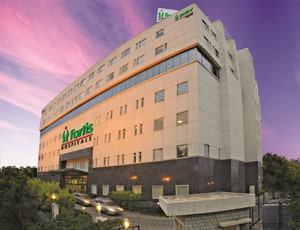
Types of Lung Cancer Treatment in Fortis Hospital and its associated cost
| Treatment Option | Approximate Cost Range (USD) | Approximate Cost Range (INR) |
|---|---|---|
| Lung Cancer Treatment (Overall) | 6067 - 8132 | 499340 - 668760 |
| Surgery | 4067 - 7076 | 333307 - 579931 |
| Lobectomy | 1530 - 6072 | 124989 - 498443 |
| Pneumonectomy | 2040 - 8108 | 165741 - 667737 |
| Segmentectomy | 1530 - 5096 | 125436 - 417622 |
| Chemotherapy | 812 - 2031 | 66290 - 166424 |
| Targeted Therapy | 1012 - 3036 | 83341 - 250527 |
| Immunotherapy | 1519 - 3542 | 124709 - 291913 |
| Radiation Therapy | 2023 - 4563 | 165869 - 376216 |
| Palliative Care | 507 - 1525 | 41618 - 124455 |
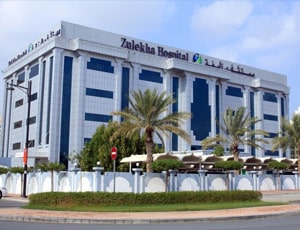
Types of Lung Cancer Treatment in Zulekha Hospital Dubai and its associated cost
| Treatment Option | Approximate Cost Range (USD) | Approximate Cost Range (AED) |
|---|---|---|
| Lung Cancer Treatment (Overall) | 27916 - 34061 | 100972 - 123126 |
| Surgery | 11033 - 16538 | 41935 - 61980 |
| Lobectomy | 9462 - 13701 | 34706 - 50262 |
| Pneumonectomy | 9982 - 15808 | 36522 - 58151 |
| Segmentectomy | 8303 - 13588 | 31075 - 48944 |
| Chemotherapy | 2826 - 6781 | 10308 - 25086 |
| Targeted Therapy | 2261 - 8921 | 8168 - 33681 |
| Immunotherapy | 2815 - 11148 | 10232 - 40984 |
| Radiation Therapy | 3971 - 12509 | 14325 - 46264 |
| Palliative Care | 1114 - 4576 | 4134 - 16330 |
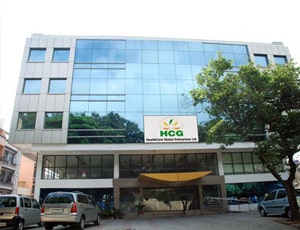
Types of Lung Cancer Treatment in HCG Kalinga Rao Road and its associated cost
| Treatment Option | Approximate Cost Range (USD) | Approximate Cost Range (INR) |
|---|---|---|
| Lung Cancer Treatment (Overall) | 6065 - 8097 | 499290 - 665468 |
| Surgery | 4065 - 7138 | 332609 - 582149 |
| Lobectomy | 1517 - 6091 | 124257 - 499223 |
| Pneumonectomy | 2026 - 8152 | 166786 - 668586 |
| Segmentectomy | 1524 - 5087 | 125335 - 417100 |
| Chemotherapy | 811 - 2029 | 66679 - 166941 |
| Targeted Therapy | 1013 - 3048 | 83278 - 248595 |
| Immunotherapy | 1523 - 3554 | 124835 - 290202 |
| Radiation Therapy | 2038 - 4557 | 166164 - 374895 |
| Palliative Care | 506 - 1515 | 41555 - 125286 |
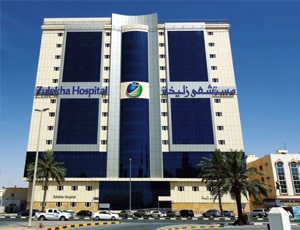
Types of Lung Cancer Treatment in Zulekha Hospital Sharjah and its associated cost
| Treatment Option | Approximate Cost Range (USD) | Approximate Cost Range (AED) |
|---|---|---|
| Lung Cancer Treatment (Overall) | 28278 - 33324 | 101191 - 125617 |
| Surgery | 11039 - 17031 | 40575 - 62789 |
| Lobectomy | 9633 - 13563 | 35340 - 48627 |
| Pneumonectomy | 9979 - 15627 | 37279 - 57284 |
| Segmentectomy | 8271 - 13772 | 30629 - 49767 |
| Chemotherapy | 2837 - 6737 | 10261 - 24753 |
| Targeted Therapy | 2238 - 9007 | 8423 - 33195 |
| Immunotherapy | 2763 - 11339 | 10275 - 41939 |
| Radiation Therapy | 3852 - 12648 | 14316 - 45177 |
| Palliative Care | 1128 - 4402 | 4075 - 16259 |
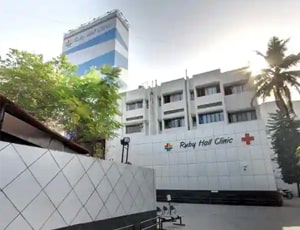
Types of Lung Cancer Treatment in Ruby Hall Clinic and its associated cost
| Treatment Option | Approximate Cost Range (USD) | Approximate Cost Range (INR) |
|---|---|---|
| Lung Cancer Treatment (Overall) | 5680 - 7559 | 463075 - 608551 |
| Surgery | 3790 - 6578 | 304372 - 536188 |
| Lobectomy | 1382 - 5531 | 114840 - 454780 |
| Pneumonectomy | 1872 - 7371 | 152068 - 614857 |
| Segmentectomy | 1399 - 4645 | 115854 - 387597 |
| Chemotherapy | 751 - 1845 | 60424 - 154467 |
| Targeted Therapy | 948 - 2806 | 77169 - 229357 |
| Immunotherapy | 1381 - 3300 | 116258 - 268816 |
| Radiation Therapy | 1857 - 4174 | 154261 - 349786 |
| Palliative Care | 470 - 1396 | 38635 - 115143 |
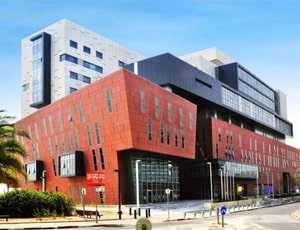
Assuta Hospital located in Tel-Aviv, Israel is accredited by JCI. Also listed below are some of the most prominent infrastructural details:
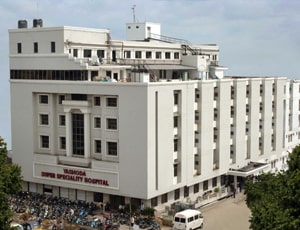
Types of Lung Cancer Treatment in Yashoda Hospital, Malakpet and its associated cost
| Treatment Option | Approximate Cost Range (USD) | Approximate Cost Range (INR) |
|---|---|---|
| Lung Cancer Treatment (Overall) | 6088 - 8145 | 499546 - 665460 |
| Surgery | 4073 - 7104 | 333389 - 583820 |
| Lobectomy | 1516 - 6097 | 125034 - 498966 |
| Pneumonectomy | 2033 - 8158 | 165734 - 663874 |
| Segmentectomy | 1521 - 5085 | 124516 - 414728 |
| Chemotherapy | 808 - 2025 | 66463 - 165991 |
| Targeted Therapy | 1019 - 3051 | 83143 - 249949 |
| Immunotherapy | 1522 - 3563 | 124910 - 292082 |
| Radiation Therapy | 2036 - 4550 | 165981 - 372883 |
| Palliative Care | 507 - 1517 | 41581 - 124264 |
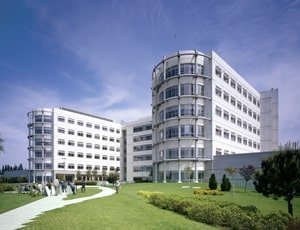
Types of Lung Cancer Treatment in Anadolu Medical Center and its associated cost
| Treatment Option | Approximate Cost Range (USD) | Approximate Cost Range (TRY) |
|---|---|---|
| Lung Cancer Treatment (Overall) | 11435 - 13231 | 340690 - 415060 |
| Surgery | 6735 - 10236 | 204868 - 311134 |
| Lobectomy | 3873 - 9150 | 120819 - 267299 |
| Pneumonectomy | 4457 - 11438 | 133597 - 333431 |
| Segmentectomy | 3314 - 8044 | 101318 - 234657 |
| Chemotherapy | 1135 - 2831 | 34331 - 86468 |
| Targeted Therapy | 1656 - 3923 | 51343 - 117367 |
| Immunotherapy | 2229 - 4444 | 67695 - 133933 |
| Radiation Therapy | 2862 - 6108 | 83961 - 187963 |
| Palliative Care | 1107 - 3374 | 33205 - 102572 |
DOCTORS IN 12 SPECIALITIES
FACILITIES & AMENITIES
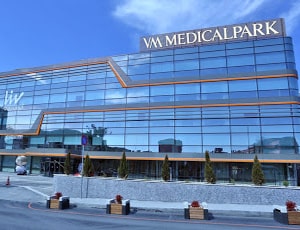
Types of Lung Cancer Treatment in I.A.U VM Medical Park Florya Hospital and its associated cost
| Treatment Option | Approximate Cost Range (USD) | Approximate Cost Range (TRY) |
|---|---|---|
| Lung Cancer Treatment (Overall) | 11099 - 13233 | 336639 - 415889 |
| Surgery | 6879 - 10210 | 206991 - 306108 |
| Lobectomy | 3931 - 9140 | 116877 - 276022 |
| Pneumonectomy | 4522 - 11281 | 134543 - 346336 |
| Segmentectomy | 3437 - 7877 | 102455 - 232433 |
| Chemotherapy | 1140 - 2826 | 33698 - 84031 |
| Targeted Therapy | 1702 - 3932 | 50075 - 116467 |
| Immunotherapy | 2247 - 4416 | 66682 - 135514 |
| Radiation Therapy | 2817 - 6275 | 86192 - 185095 |
| Palliative Care | 1136 - 3448 | 33700 - 103622 |
DOCTORS IN 15 SPECIALITIES
FACILITIES & AMENITIES
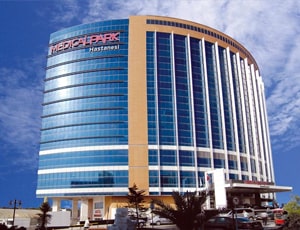
Types of Lung Cancer Treatment in Medical Park Bahcelievler Hospital and its associated cost
| Treatment Option | Approximate Cost Range (USD) | Approximate Cost Range (TRY) |
|---|---|---|
| Lung Cancer Treatment (Overall) | 11134 - 13597 | 346552 - 412287 |
| Surgery | 6625 - 10144 | 202347 - 302527 |
| Lobectomy | 3917 - 9116 | 118734 - 277002 |
| Pneumonectomy | 4464 - 11232 | 133906 - 338801 |
| Segmentectomy | 3382 - 7879 | 99623 - 233238 |
| Chemotherapy | 1121 - 2795 | 33767 - 83513 |
| Targeted Therapy | 1701 - 3854 | 50435 - 119896 |
| Immunotherapy | 2299 - 4577 | 67585 - 134970 |
| Radiation Therapy | 2825 - 6062 | 85023 - 187408 |
| Palliative Care | 1126 - 3448 | 33447 - 103862 |
DOCTORS IN 12 SPECIALITIES
FACILITIES & AMENITIES
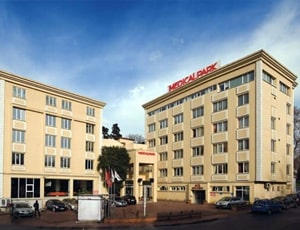
Types of Lung Cancer Treatment in Medical Park Fatih Hospital and its associated cost
| Treatment Option | Approximate Cost Range (USD) | Approximate Cost Range (TRY) |
|---|---|---|
| Lung Cancer Treatment (Overall) | 11159 - 13203 | 339799 - 407998 |
| Surgery | 6737 - 9961 | 206280 - 302311 |
| Lobectomy | 4001 - 9200 | 117033 - 269899 |
| Pneumonectomy | 4511 - 11121 | 138244 - 344057 |
| Segmentectomy | 3436 - 7761 | 101686 - 237812 |
| Chemotherapy | 1114 - 2820 | 34458 - 84021 |
| Targeted Therapy | 1672 - 4018 | 51051 - 120373 |
| Immunotherapy | 2259 - 4438 | 66695 - 133955 |
| Radiation Therapy | 2800 - 6160 | 84926 - 186732 |
| Palliative Care | 1127 - 3414 | 33814 - 99777 |
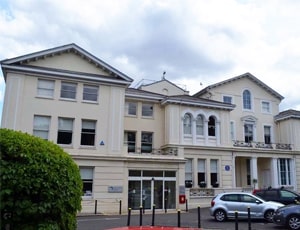
Apart from in-detail treatment procedures available, Cancer Centre London located in London, United Kingdom has a wide variety of facilities available for International Patients. Some of the facilities which are provided by them are Accommodation, Airport Transfer, Choice of Meals, Interpreter, SIM, TV inside room. Also listed below are some of the most prominent infrastructural details:
Lung cancer is an uncontrolled growth of cells that start off in the lungs. Usually, lung cancer starts in the cells that line the air passages. Instead of developing into healthy lung tissue, the cells divide rapidly and form tumours.
Lung cancer can grow and spread beyond the lung to reach other parts of the body through metastasis. Lung cancers can begin in any part of the lung, but 90 percent of lung cancers begin in the epithelial cells, which are the cells lining the larger and smaller airways also known as bronchi and bronchioles.
This is the reason why lung cancers are sometimes called bronchogenic cancers or bronchogenic carcinomas. Lung cancer is the most common cancer in the world, among both men and women. It is the leading cause of cancer deaths worldwide.
Long-term smoking is the main cause of lung cancer. After smoking, genetic factors and exposure to radon gas, asbestos, second-hand smoke or other forms of air pollution can also increase the risk of lung cancer.
There are two major types of lung cancers, based on the appearance of lung cancer cells under the microscope:
It is necessary to determine the stage of lung cancer by finding out how far cancer has spread, before initiating treatment of lung cancer.
The following are the four lung cancer stages of NSCLC:
After the determination of stage, treatment of lung cancer starts with choosing the best suitable option for the patient. However, there is usually no single treatment for lung cancer. So the patient often receives a combination of therapies and palliative care.
Lung cancer symptoms may vary, depending upon where and how widespread the tumour is. A person with lung cancer may have following lung cancer symptoms:
The treatment of lung cancer may include the following modalities:
Surgery is the best treatment if the lung cancer is in its early stages. In the early stages, it is possible to cure a patient completely by removing the tumor and the nearby lymph nodes. But after cancer has spread, it is nearly impossible to remove all of the cancer cells with the help of surgery.
There are some specific types of surgical procedures for different location and kinds of lung cancers, such as wedge resection of the lung (removal of a portion of one lobe), lobectomy (removal of one lobe), pneumonectomy (removal of an entire lung) and lymphadenectomy (removal of lymph nodes in the region of the lungs). After the surgery, margin tissues are further studied to see if cancer cells are present or not.
Lung cancer surgery is a major surgical procedure that requires hospitalization, general anesthesia, and follow-up care for a few weeks to several months. It also carries side effects like any other surgery, including complications related to bleeding, infection, and general anesthesia.
This treatment uses high-energy X-rays or other types of radiation to destroy or shrink lung cancer tumors. Radiation therapy can be given as a curative therapy, palliative therapy, or as adjuvant therapy combined with surgery or chemotherapy.
Radiation therapy damages the molecules that make up the cancer cells. However, it can damage the normal, healthy tissues. But nowadays improved technology can focus the radiation on precise locations for certain lengths of time, thus reducing the risk of damage to the surrounding healthy tissues.
Chemotherapy is a strong medication treatment, which interferes with the cell division process and damage proteins or DNA to reduce cancer cells. NSCLC and SCLC, both types of lung cancers can be treated with chemotherapy. Chemotherapy might be given in the form of pills, intravenous infusion, or as a combination of both.
However, drugs used in chemotherapy also kill normally dividing cells in the body that may lead to unpleasant side effects. Some of the common side effects of chemotherapy are vomiting, diarrhea, appetite loss, hair loss, fatigue, anemia, infections and more. These side effects may be felt temporarily during treatment, and several drugs exist to help patients cope with the symptoms.
Drugs used in this treatment work by targeting specific abnormalities in the cancer cells. Some of the drugs in this treatment can also strengthen the activity of the immune system against cancer cells. But mostly this treatment only works in people whose cancer cells show certain genetic mutations.
Ask your healthcare adviser for the best multiple options and choose the one that meets your expectations